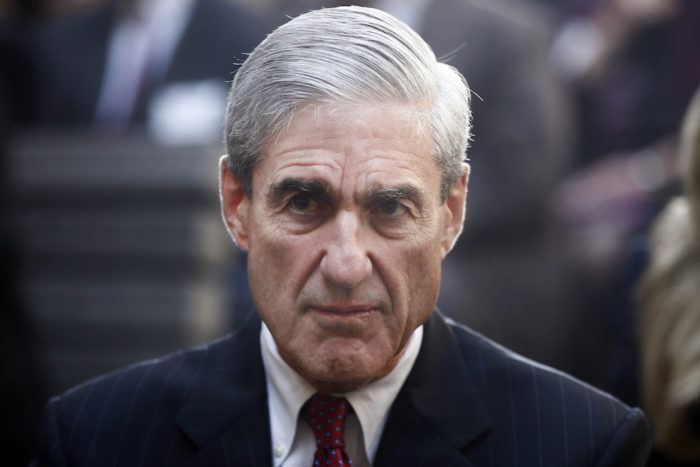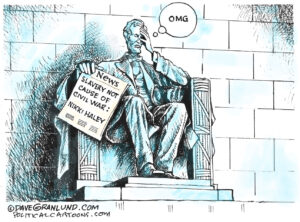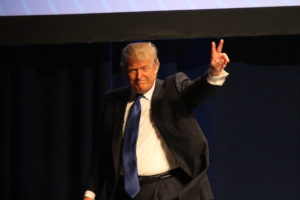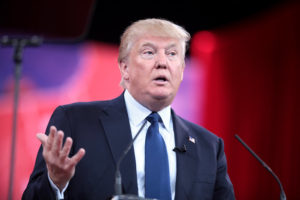The Coming Constitutional Crisis
Are we on the threshold of another Watergate—or something worse? Justice Department special counsel Robert Mueller. (Charles Dharapak / AP)
Justice Department special counsel Robert Mueller. (Charles Dharapak / AP)
Hegel remarks somewhere that all great world-historic facts and personages appear, so to speak, twice. He forgot to add: the first time as tragedy, the second time as farce. —Karl Marx, “The Eighteenth Brumaire of Louis Napoleon” (1852)
Anyone following the Mueller investigation of alleged Russian meddling with the 2016 U.S. presidential election can sense that the legal noose around the Trump administration is tightening and that something very big is about to happen.
To date, Justice Department special counsel Robert Mueller III has indicted two top Trump campaign aides—Paul Manafort and Richard Gates—on charges of money laundering, failing to register as foreign agents, conspiracy against the United States, and other serious federal felonies stemming from their work on behalf of the former pro-Russia government of Ukraine. In addition, Trump’s first national security chief, Lt. Gen. Michael Flynn, has pleaded guilty to lying to the FBI about his post-election contacts with then-Russian ambassador Sergey Kislyak about the lifting of U.S. sanctions. And one-time foreign policy adviser George “Coffee Boy” Papadopoulos has pleaded guilty to lying about his attempts during the campaign to obtain dirt on Hillary Clinton, including her 30,000 deleted emails, from Russian sources.
No one seriously believes that Mueller is finished. As I noted in my last Truthdig column, both Donald Trump Jr. and Jared Kushner are on the hook for various acts and omissions that fall within Mueller’s broad mandate to investigate “any links/and or coordination” between Donald Trump’s election campaign and Russia, and “any matters that may arise” directly from such an investigation. The president himself is also in jeopardy for possibly attempting to obstruct the probe.
But so, too, is Mueller in jeopardy. He’s not in imminent danger of being charged with any federal crimes but of being sacked by Trump in a redux of the “Saturday Night Massacre,” the name given to Richard Nixon’s October 1973 firing of Archibald Cox, the first Watergate special prosecutor, who subpoenaed Nixon to turn over audiotapes made in the Oval Office regarding the Watergate burglary and subsequent cover-up.
The past few days have seen a steady and increasing drumbeat of invective against Mueller, with prominent House Republicans openly denouncing the special counsel for alleged political bias, and Fox News personalities calling for him to go the way of Cox. Joining the anti-Mueller hysteria, attorney John Dowd, the president’s personal lawyer, issued the astounding Nixonian claim last week that as the nation’s top law enforcement officer, the president cannot obstruct justice as a matter of law.
And so the question arises: Are we on the threshold of another Watergate moment that resulted in the downfall of a corrupt president, or does the current period offer something sui generis (unique) and even more dangerous: a blend, to borrow from Marx’s trenchant observation in the “Eighteenth Brumaire,” of both deep political rot and personal incompetence and buffoonery that will result in a full-scale, systemic constitutional crisis, which was averted during Watergate with Nixon’s resignation in 1974?
To arrive at an answer, we have to define our terms. Although there is no universally accepted definition of a constitutional crisis, Vox commentator Dylan Matthews interviewed seven prominent experts about the subject for an article published in May. Among other things, Matthews noted that there are two leading constitutional treatises on the meaning of constitutional crises, the first by Princeton political scientist Keith Whittington and the other by law professors Jack Balkin of Yale and Sanford Levinson of the University of Texas, Austin.
While the authors of the two studies differ in some significant ways, they agree, as Whittington told Matthews, that “constitutional crises arise out of the failure, or strong risk of failure, of a constitution to perform its central functions.”
Whittington subdivided constitutional crises into “operational” and “fidelity” categories. The operational type, according to Whittington as paraphrased by Matthews, occurs “when important political disputes cannot be resolved within the existing constitutional framework.” On the other hand, crises of constitutional fidelity occur when the Constitution’s meaning is clear, but one or more branch of government or key political actor willfully defies the charter’s clear meaning.
To the operation/fidelity taxonomy, Balkin and Levinson added a third type of crisis, which Matthews (again paraphrasing) calls a “power struggle,” in which “two or more political actors believe the other is violating the Constitution and neither is willing to budge.”
The archetypal constitutional breakdown, embodying all three dimensions, was the secession crisis that led to the Civil War. By the late 1850s, the slave-based economy of the Southern states had become incompatible with the wage-based industries of the North. Although the infamous “three-fifths clause” of the Constitution (Article 1, Section 2) recognized slavery, the Constitution was silent on the right of states to withdraw from the union.
From the founding of the nation to the Civil War, the federal government had tried to hold the country together with a series of legislative compromises designed to retain a congressional balance of power between slave and free-market states. Then in 1857, in what is surely the worst decision in its history—Dred Scott v. Sanford—the Supreme Court invalidated the Missouri Compromise of 1820 and held that no black person anywhere in the United States could ever become a citizen. Short of capitulation to secession, there was no way to resolve the impasse other than by force.
Not every national emergency, of course, rises to the level of a constitutional calamity. In Whittington’s view, for example, neither Watergate nor the contested 2000 presidential election should be classified as constitutional crises. Watergate was resolved with Nixon’s decision to leave office rather than face impeachment and removal. The 2000 election was resolved within our existing legal framework as a result of another Supreme Court decision, albeit an outrageously partisan one—Bush v. Gore.
In the early 1970s, the Republican Party had not yet entirely surrendered the last vestiges of political morality to the venal forces that dominate it today. Republicans, for the most part, put country over party and joined with their Democratic counterparts to rid the nation of a corrupt and criminal president.
By 2000, the Democratic Party, now spineless and fully captive to its corporate wing and the policies of neoliberalism, failed to mobilize its shrinking working- and middle-class base against the electoral theft that placed George W. Bush in office.
In both instances, Democratic and Republican leadership accepted the outcomes and agreed to move on. The status quo limped along.
The Mueller probe is no magic bullet for the nation’s many ills. But if President Trump decides to fire Mueller before his investigation is complete, how will the Democrats—and more importantly, the rest of us who have come increasingly to understand that neither major party represents our true economic or political interests—react as the country is stripped of any remaining restraints on executive authority, and we descend to the status of a bloated banana republic?
Will the resulting consolidation of what Henry Giroux aptly calls “Gangster Capitalism” precipitate a genuine constitutional crisis? I think you can count on it.
Your support matters…Independent journalism is under threat and overshadowed by heavily funded mainstream media.
You can help level the playing field. Become a member.
Your tax-deductible contribution keeps us digging beneath the headlines to give you thought-provoking, investigative reporting and analysis that unearths what's really happening- without compromise.
Give today to support our courageous, independent journalists.






You need to be a supporter to comment.
There are currently no responses to this article.
Be the first to respond.